Unit 2 My week 复习课件(词组+句型+语音+语法+写作指导)
文档属性
| 名称 | Unit 2 My week 复习课件(词组+句型+语音+语法+写作指导) |
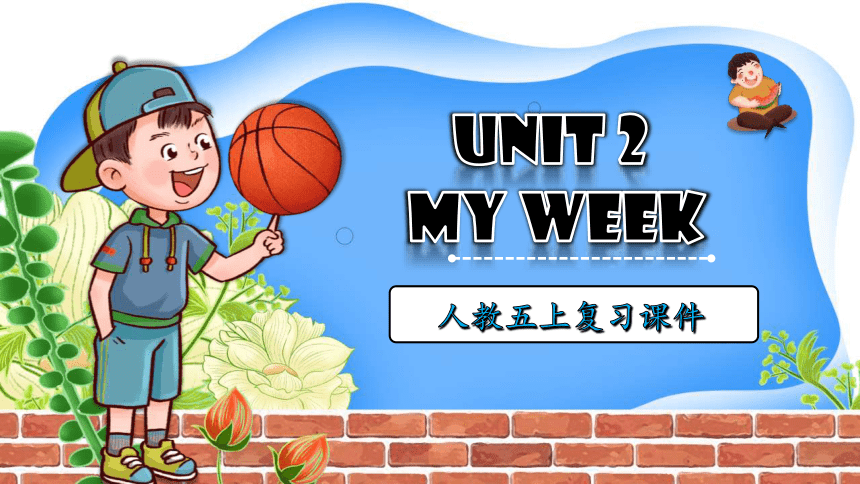
|
|
| 格式 | pptx | ||
| 文件大小 | 43.5MB | ||
| 资源类型 | 试卷 | ||
| 版本资源 | 人教版(PEP) | ||
| 科目 | 英语 | ||
| 更新时间 | 2024-12-16 00:00:00 | ||
图片预览

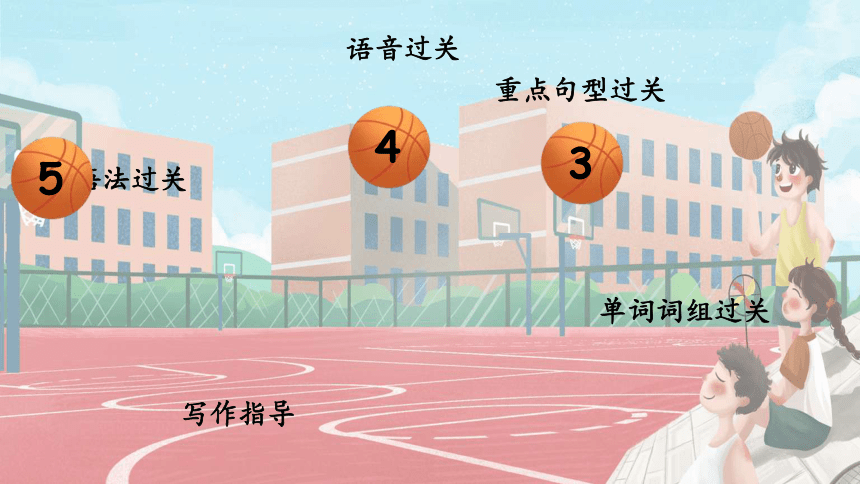
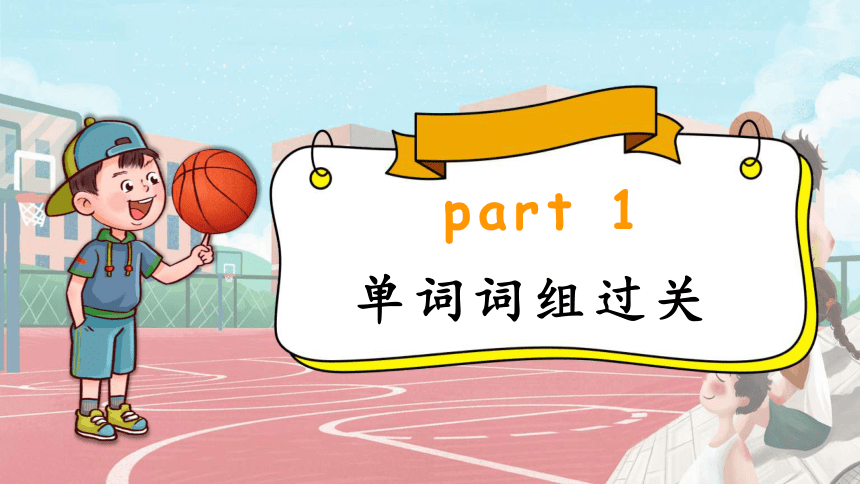
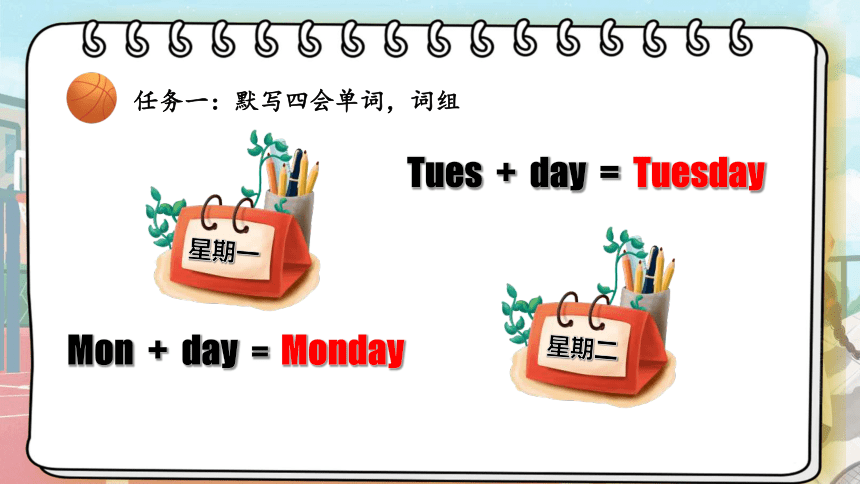

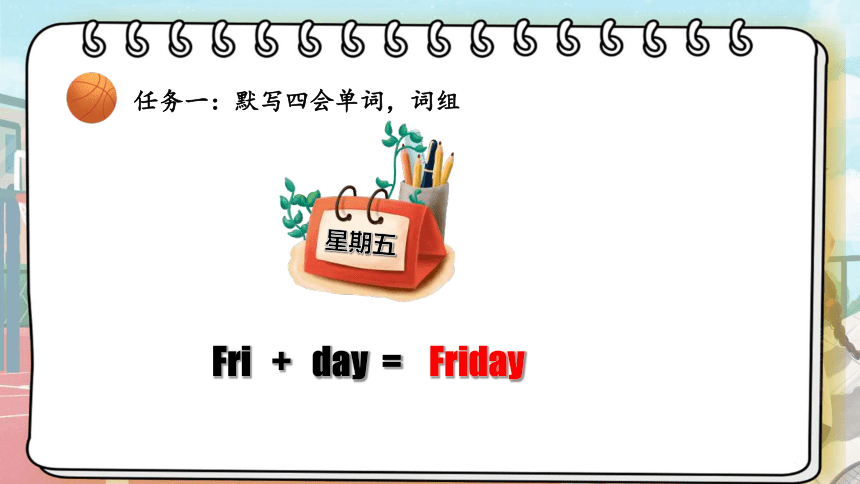
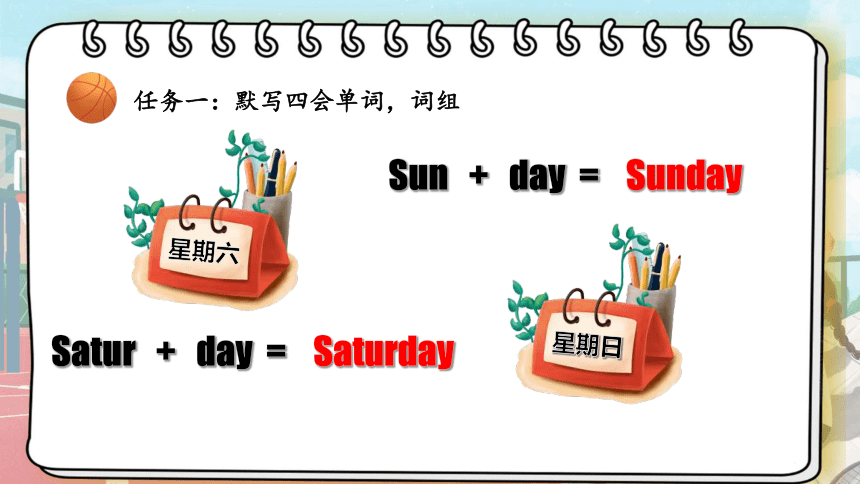

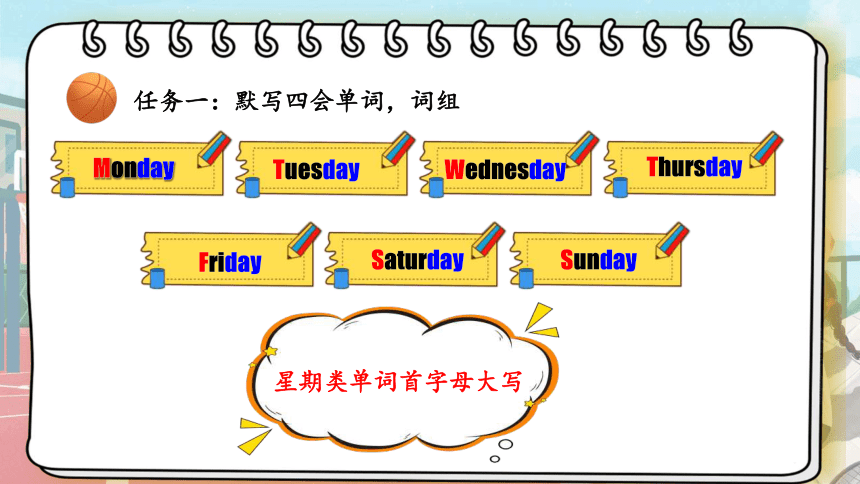
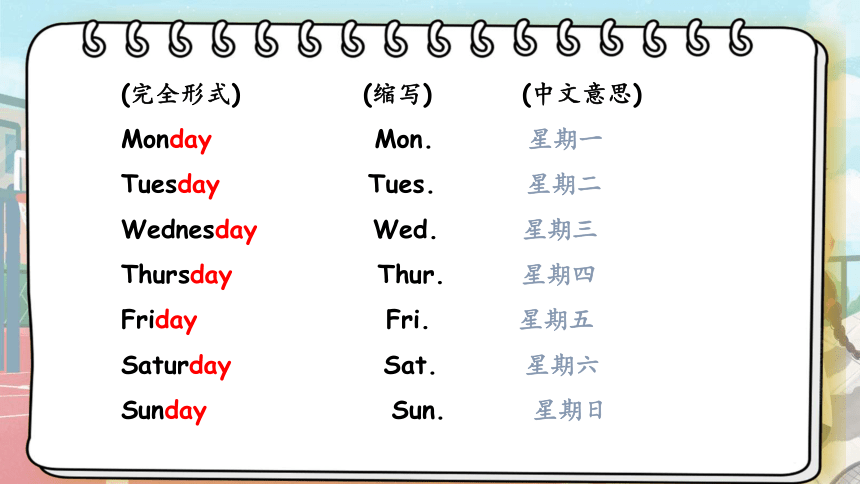
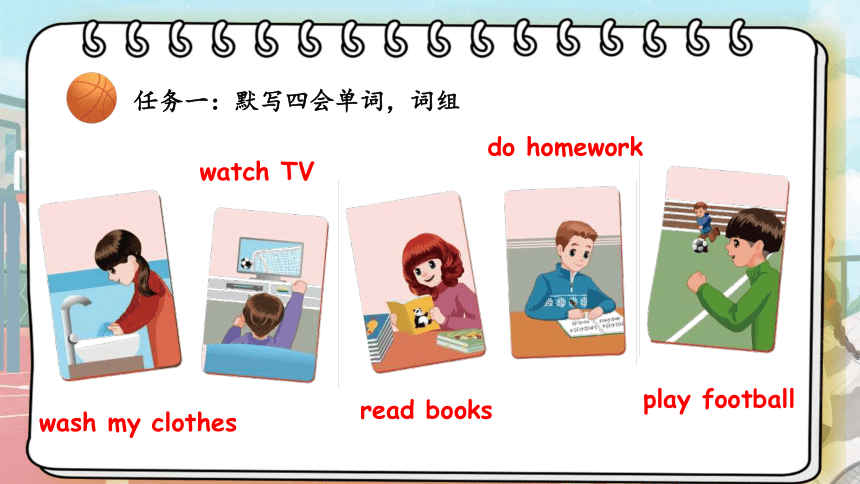
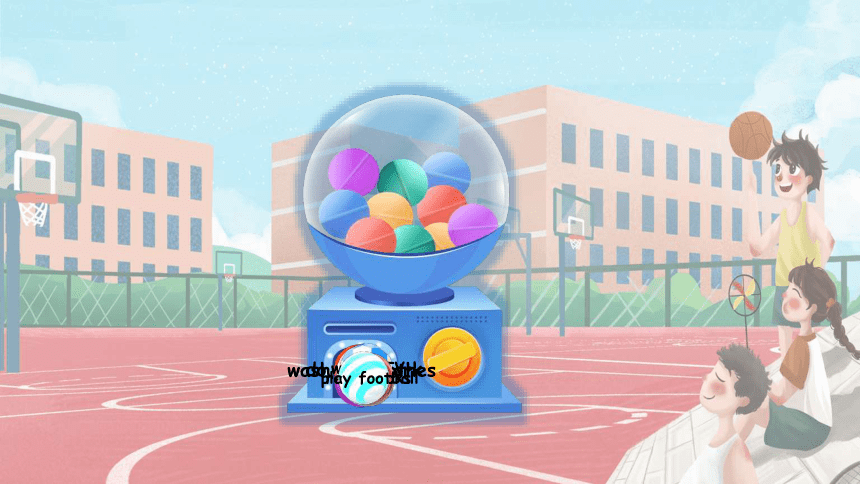
文档简介
(共148张PPT)
Unit 2
My Week
人教五上复习课件
单词词组过关
1
2
重点句型过关
3
语音过关
4
语法过关
5
写作指导
单词词组过关
part 1
任务一:默写四会单词,词组
星期一
Mon + day = Monday
星期二
Tues + day = Tuesday
任务一:默写四会单词,词组
星期三
Wednes + day = Wednesday
星期四
Thurs + day = Thursday
任务一:默写四会单词,词组
星期五
Fri + day = Friday
任务一:默写四会单词,词组
星期六
Satur + day = Saturday
星期日
Sun + day = Sunday
任务一:默写四会单词,词组
Saturday
Sunday
weekend
week + end = weekend
任务一:默写四会单词,词组
Monday
Tuesday
Wednesday
Thursday
Friday
Saturday
Sunday
星期类单词首字母大写
(完全形式) (缩写) (中文意思)
Monday Mon. 星期一
Tuesday Tues. 星期二
Wednesday Wed. 星期三
Thursday Thur. 星期四
Friday Fri. 星期五
Saturday Sat. 星期六
Sunday Sun. 星期日
任务一:默写四会单词,词组
wash my clothes
watch TV
read books
do homework
play football
do homework
do
wash my clothes
play
wash
watch TV
read books
play football
Monday
Wednesday
Thursday
Tuesday
Monday
Friday
weekend
Sunday
Saturday
Monday
Tuesday
Wednesday
Thursday
Friday
Saturday
Sunday
Whack-a-mole
Play a game:
Minesweepers.
号码牌下面埋着雷,
点击号码牌,读出下面
的词组,认读对了加分,
遇到地雷则扣分。
wash my clothes
watch TV
do
homework
read books
play
football
1
2
3
4
5
6
7
8
9
Do you often... on the weekend
Yes, I do./
No, I don’t.
Play a game:
The turntable game.
任务二:记忆三会单词,词组
活动类
做体育运动__________________听音乐____________________
打乒乓球____________________ 画图画____________________
打扫我的房间 __________________去购物____________________
做家务:__________________玩游戏:__________________
有一节足球/篮球课:____________________________________
play sports
listen to music
play ping-pong
draw pictures
clean my room
do some shopping
do housework
play games
have a football/basketball class
任务二:记忆三会单词,词组
打排球:__________________打网球:__________________ 洗脸:__________________ 划船:__________________
浇花:__________________ 弹琵琶:__________________
play volleyball
play tennis
wash my face
row a boat
water flowers
play the pipa
任务二:记忆三会单词,词组
其他
日、天__________ 有、吃__________ 在…时候__________
太 __________ 足__________ 茶__________
牛肉__________ 遇见__________ 吃__________
读、看__________ 看见__________ 大海__________
重复__________ 建议:__________
day
have
when
too
feet/foot
tea
beef
meet
eat
read
see
sea
repeat
advice
任务二:记忆三会单词,词组
每天:__________ 每年:__________ 每月:__________
一张新的日程安排:____________________
感到疲倦:__________ 运动日:__________
工作日程安排:____________________
购物:__________需要:__________放回去:__________
every day
every year
every month
a new schedule
feel tired
sports day
work schedule
shopping
need
put back
任务二:记忆三会单词,词组
一盒蜡笔____________________ 足够的钱____________________
在周一__________________ 在周末____________________
在公园里:__________________新学期:____________________
看起来很累:__________________
a box of crayons
enough money
on Monday
on the weekend
in the park
a new school year
look tired
任务三:连线。找到相应单词的汉语翻译。
watch TV
read books
do homework
play football
play computer games
做作业
看电视
踢足球
玩电脑游戏
读书
任务三:连线。找到相应单词的汉语翻译。
Friday
Tuesday
星期二
星期三
星期四
星期五
星期一
Wednesday
Thursday
Monday
任务四:读一读,看一看,写一写(每空写一个词)。
1. I ________ ________ on Tuesdays.
2. I ______ ___________ on Wednesdays.
3. I ________ ________ in the morning.
watch TV
do homework
read books
任务四:读一读,看一看,写一写(每空写一个词)。
4. I ________ ________ on the weekend.
5. I ________ ________ every day.
wash clothes
play football
任务四:读一读,看一看,写一写(每空写一个词)。
6. I often________________
on the weekend.
7. —Do you often __________?
—Yes, I do.
do my homework
watch TV
任务四:读一读,看一看,写一写(每空写一个词)。
8. We often ____________
together on the weekend.
9. I often ______________
on Sundays.
10. —Does Mark often __________
—Yes, he does.
play football
wash my clothes
read books
任务五:根据图片完成句子。
1. We have English and _______on ________.
2. We have _____and Chinese on _______.
3. We have ___ and Chinese on _______.
science
Tuesdays
maths
Thursdays
art
Fridays
任务五:根据图片完成句子。
4. We have music on __________.
5. We have art on________.
6. We have maths on____________.
7. We have no classes on__________.
8. We often fly kites on________.
Monday
Friday
Saturday
Wednesday
Sunday
任务六:选出不同类的单词,并将其序号填到题前括号内。
( ) 1. A. tired B. Monday C. Friday
( ) 2. A. Chinese B. art C. schedule
( ) 3. A. wash B. play C. sports
A
C
C
任务七:好朋友,手牵手。从左、右两列各选1个单词连线,组成一个新单词。
1. foot A. end
2. week B. room
3. house C. fast
4. break D. board
5. bath E. ball
6. black F. work
football
housework
blackboard
breakfast
bathroom
weekend
任务八:仿照例子, 写几个词语。
例:bed + room = bedroom
Mon + day = Monday
1. ________ +________=________
2. ________ +________=__________
3. ________ +________=________
Tues day Tuesday
Wednes day Wednesday
Thurs day Thursday
任务八:仿照例子, 写几个词语。
4. ________ +________=________
5. ________ +________=________
6. ________ +________=________
Fri day Friday
Satur day Saturday
Sun day Sunday
句型过关
part 2
任务一:背诵默写重点句型。
1.询问做什么事/活动:
①询问你做什么事情?
—What do you do …
—I often play ping-pong…
②询问他/她/某人做什么事情?
-What does he/she/Amy do...
-He/She/Amy +动词三单形式...
任务一:背诵默写重点句型。
2.询问星期几上什么课:
①询问你星期几上什么课程?
—What do you have on …
—I have ...class on …
②询问他/她/某人星期几上什么课程?
-What does he/she/Amy have...
-He/She/Amy has...class on...
任务一:背诵默写重点句型。
1.—What do you have on Thursdays 星期四你们有什么课?
—I have math, English and music. 我们有数学、英语和音乐课。
2.—What do you do on Thursdays, Grandpa
爷爷,星期四你要做什么?
—I have a cooking class with your grandma.
我和你奶奶去上烹饪课。
任务一:背诵默写重点句型。
3.—Do you often read books in this park
你经常在这个公园看书吗?
—Yes, I do. 是的 —No, I don’t. 不是
4.—What about you /And you 你怎么样?/你呢?
—I do my homework, too. 我也做作业。
5.Look at my picture. 看我的图片。
6.You look tired. 你看起来很累。
任务二:读对话, 选择对应的图片。
A B C D
( )1. —What do you have on Mondays
—We have an art class.
D
A B C D
( )2. —What do you have on Wednesdays
—We have PE.
( )3. —What do you have on Tuesdays
—We have English.
B
C
A B C D
( )4. —What do you have on Thursdays
—We have music.
A
任务三、给下列句子选出正确的答语。
( )1. What do you do on Thursdays
( )2. Who’s your science teacher
A
D
A. Mr White.
B. No, she is funny.
C. We have Chinese and music.
D. I often do my homework.
E. Yes, he is. He’s thin, too.
任务三、给下列句子选出正确的答语。
( )3. What do you have on Mondays
( )4. Is she strict
( )5. Is your grandfather
tall
B
C
E
A. Mr White.
B. No, she is funny.
C. We have Chinese and music.
D. I often do my homework.
E. Yes, he is. He’s thin, too.
任务三、给下列句子选出正确的答语。
A.Ms Green. B.I have maths, English and music.
C.I often watch TV. D. She’s young and kind.
( )1.What’s your mother like
( )2.What do you do on the weekend
( )3.Who’s your art teacher
( )4.What do you have on Mondays
B
C
D
A
任务四、补全对话。
A: Hello, Bob! May I ask you some questions
B: Yes, please.
A: 1. ________
B: We have four.
A. What subject do you like best
B. What about afternoon
C. Do you like music
D. How many lessons do you have in the morning
E. What are they
D
任务四、补全对话。
A. What subject do you like best
B. What about afternoon
C. Do you like music
D. How many lessons do you have in the morning
E. What are they
A: 2. ________
B: They are maths, Chinese, English and PE.
A: 3. ________
B: We have two. They are music and art.
E
B
任务五、连词成句。
1. have on do what you Fridays(?)
_________________________________________
2. music have we(. )
_________________________________________
What do you have on Fridays
We have music.
任务五、连词成句。
3. picture at look this(. )
______________________________________
4. computer is teacher who your(?)
______________________________________
5. with a I dance have class friends my(. )
______________________________________
Look at this picture.
Who is your computer teacher
I have a dance class with my friends.
任务六、按要求完成句子。
1. Is it Saturday today (用Wednesday回答)
________________________________________
2. We have maths and PE on Tuesdays. (对画线部分进行提问)
________________________________________
No, it’s Wednesday.
What do you have on Tuesdays
3. I often wash my clothes on the weekend.
(变一般疑问句并作否定回答)
______you often _____ _____clothes on the weekend
No, ________ ________.
4. I often read books in the afternoon. (变一般疑问句并作肯定回答)
_____ _____often _____ ______in the afternoon
Yes, ________ ________.
Do wash your
I don’t
Do you read books
I do
3. I often watch TV with my father.
(对画线部分进行提问)
________ ________ ________ often ________ with ________ father
What do you do
your
任务七:根据图片补全问句或答语。
1. —What do you do on Saturdays
—____________________
2. —_____________________________
—Yes, I do.
I often watch TV.
Do you often do your homework
3. —______________________________
—I have maths and Chinese .
4. —Do you often listen to music
—_________________________________
What do you have on Wednesdays
No, I often wash my clothes.
5. —What day is it today
—It’s___________.
—What do you ________ on ___________?
—I have ________ and________.
Thursday
have Thursdays
Chinese English
6. —Who’s your__________________?
—Mr Young.
—________ he kind
—No, he________.
maths teacher
Is
isn’t
7. —What do you ________on Tuesdays, Grandpa
—I have a __________class ________ your grandma.
do
cooking
with
语音过关
part 3
任务一:字母组合ee, ea的发音
发音规则 例词
(1)舌尖抵下齿,舌前部尽量向硬腭抬起。 (2)嘴唇向两旁伸开,成扁平形。 feet 脚
beef 牛肉
read 读
eat 吃
任务一:字母组合ee, ea的发音
tea
read
eat
feet
beef
meet
ea
/ i: /
ee
read
eat
tea
flea
sea
easy
pea
peach
please
clean
ea
ea的发音:
feed
beef
meet
three
tree
see
keep
deep
feel
seek
ee
ee的发音:
任务二:字母组合ea的其他发音
[ e ]:ready weather head sweater
[ i: ]:eat seat read repeat
[ ei ]:break great
[ i ]:really idea real
Start
/Stop
meal
feel
feed
wheel
knee
sea
please
meat
deal
bee
Try to spell
beef
feet
meet
tea
read
eat
meet
feet
eat
任务三:选出不同类单词,并将其序号写在括号里。
( )(1)A. Sunday B. Saturday C. often
( )(2)A. Chinese B. Wednesday C. Monday
( )(3)A. art B. maths C. have
( )(4)A. music B. Friday C. PE
C
A
C
B
任务四:判断下列单词画线部分的读音是否相同,相同的打“√”,不同的打“×”。
( )1.A.feet B.foot C.book
( )2.A.meat B.meet C.tea
( )3.A.beef B.bread C.read
( )4.A.sea B.see C.green
×
√
×
√
任务四:判断下列每组单词画线部分发音是否相同, 相同的画 , 不同的画 。
( )1.
( )2.
( )3.
( )4.
( )5.
任务五:读一读, 判断句子中单词画线部分的发音是(T) 否(F)相同。
( )1. I see a sheep sleeping on the jeep.
( )2. I eat some beef, meat, bread for breakfast.
( )3. Could you read and repeat it
( )4. The bee and the sheep see the food.
( )5. There is some bread in the teacher’s hand.
T
F
T
T
F
语法过关
part 4
—What do you have on Thursdays
—I have maths, English and music.
询问某人“在(星期几)有什么(课)”的句型
这是由What引导的特殊疑问句,其句型结构为:
What + do + 主语 + have +时间(on + 星期单词的复数形式)
考向1
考向1
答语:句型结构为“主语+have + 课程 (+时间).”用来回答(某一天)有什么课程。
拓展
如果主语是第三人称单数形式时,提问要用does。
例句:—What does Amy have on Fridays
—She has art and music.
易错点提示:
句中的“星期单词”用了复数形式,这样用强调的是每周的这一天都是如此。
—What do you have on Thursdays
—I have maths, English and music.
考向2
on 的用法:“on + 星期名称”表示“在星期几”。
如:on Thursday 在星期四
例句:We have English and art on Wednesdays.
我们在星期三有英语和美术课。
拓展:介词用on表示时间的短语
on May 4th 在5月4日
on Wednesday morning在星期三的早晨
Children’s Day is ________June 1st.
A. in B. at C. on
典例
点拨:
C
on用在具体的某一天前,故选C。
拓展:on与at,in表示时间时的用法区别
用法 意义 例子
on on+星期名称 on+具体日期 on+具体某天上午/下午 on +具体某一天 on Monday
on May 1st
on Saturday afternoon
at at+具体时刻 at+具体某一时刻 at 8 o’clock
at noon
in in+月份/年份/ 上午/下午/晚上 in+大时间 in spring
in the morning
年 月 四季,
日 号 星期,
用于时刻前(点钟),
加具体某一天,
和 ,
则需特殊来单记。
in
on
at
>1天
=1天
<1天
in
in
in
on
on
on
at
on
三长三短
修饰
三长
the morning
the afternoon
the evening
in
in
in
两短
noon
night
at
at
修饰
Monday morning
a rainy evening
the afternoon of July 1st
on
on
on
用于时刻前,亦与正午,午夜连。
黎明终止和开端, 与之紧相伴。
周,月,季,年,长时间, 须放在其前面。
泛指一晌和傍晚,也要放在 后边。
指特定某一天,日期星期节日前。
某天上下和夜晚,依然要在 后站。
今明昨天前后天,上下这那每之前。
都不用,此乃习惯记心间。
at
at
in
in
on
in
at,on,in
2020
summer
the morning
January
3:20
noon
May 1st
Monday
Sunday
Children’s Day
in
in
in
in
at
at
on
on
on
on
用in at on填空。
cooking/'k k /n.烹饪;烹调[三会]
考向
例句:I like cooking.我喜欢烹饪。
短语:have a cooking class 有一堂烹饪课
Chinese cooking 中式烹饪
词形变化:cooking(n.)烹饪;烹调→cook(v.)烹饪
Do you often read books in this park
你经常在这个公园里读书吗?
考向1
以do开头的一般疑问句的用法:用来询问对方是否经常做某事,其句式结构为:Do+ 主语(+ 频率副词)+ 动词原形 +其他?
例句:—Do you often watch TV
—Yes, I do.
考向2
答语:
肯定回答“Yes, 主语 + do.”
否定回答“No, 主语 + don’t.”两种形式。
例句:—Do you play football on the weekend
—Yes, I do.
— No, I don’t.
易错点提示
当句中的主语是第三人称单数(he, she, it)时,该疑问句要以do的第三人称单数形式does开头,而且肯定回答用 “Yes, 主语 + does.”否定回答用“No, 主语 + doesn’t.”。
例句:—Does he listen to music 他听音乐吗?
—Yes, he does.是的,他听。
— No, he doesn’t.不,他不听。
典例
1.按要求完成句子。
—Do you go to the park on the weekend
—__________(作肯定回答)
Yes, I do.
典例
2. —Do you often watch TV on the weekend
—________
A. Yes, I can. B. Yes, I am. C. Yes, I do.
C
点拨:
本句是以do开头的一般疑问句,它的肯定回答为“Yes, 主语 + do.”,故选C。
典例
3. ________ he often play football on the weekend
A. Does B. Do C. do
A
点拨:
因为主语是第三人称单数形式he,所以一般疑问句要以Does开头,后接动词原形do。
read/ri d/v.看;读
短语:read books读书
近义词:look(看),see(看见)
短语:read newspapers看报
read a magazine读杂志
例句:I often read English in the morning.
我经常在早上读英语。
考点1
拓展:
词语辨析:look, see, watch和read的用法区别。
look 强调“看”的动作。单独使用时,用来引起对方的注意;如果跟宾语,和at连用,
如:Look at the blackboard.看黑板。
see 强调“看”的结果,意为“看见,看到”,
如:I see a bird.我看见一只鸟。
watch 强调“专注地看”,有欣赏的意味,
如watch TV 看电视。
read 指阅读一类的“看”,与纸张类有关,
如read books看书。
典例
I ________ books and my mother ________ TV at weekends.
A. watch, reads B. read, watches
C. see, watches
B
点拨:
read books和watch TV是固定短语,故选B。
What do you often do on the weekend
在周末你经常干什么?
询问对方在某一天经常干什么?
句型“What do you(+often)+ 实义动词do+时间?”来提问。回答用“主语(+often)+动词(短语)+时间(时间常省略)”来完成。
考向:用法及答语
根据答语填写所缺的词,完成句子。
—What do you often ________ on Sundays
—We often play football.
点拨:
由答语“We often play football.”知,是对做什么活动提问,要用句型“What do you often do + 时间?”。
do
典例
易错点提示
当主语是第三人称单数的时候,注意问句中的助动词“do”要改成does!答语中的实义动词也要用第三人称单数形式(动词后加 s或 es)。
例句:—What does Tom often do on Wednesdays
汤姆在星期三经常干什么?
—He often draws pictures with his friends.
他常和他的朋友一起画画。
What about you 你怎么样?
用法:这是用来征求对方看法和意见的句型,通常用在自己陈述了一个事实后,来询问对方是什么情况或有什么样的看法或意见。
例句:I’m a teacher. What about you
我是一名老师。你呢?
其他表达法:And you 你呢?
How about you 你怎么样?
例句:I’m fine. And you
我很好,你呢?
典例
I play sports on the weekend. ________ you
A.What B.What about C.How
B
点拨:
本题意思是“我周末做体育运动,你呢?”,What about you 意为“你呢?”故选B。
every day与everyday的区别:
every day 每天。副词,可用作状语。
You should read books every day.
你应该每天看书。
everyday 每天的。形容词,可用作定语。
The Internet has become part of everyday life.
互联网已成为日常生活的一部分。
play 用法:
play的用法
play+球类/棋类/牌类
play+the+乐器
play+with+其他
play football
play chess
play basketball
play cards
play the piano
play the violin
play with snows
play with cats
play with Mikes
典例:选词填空
A.a B./ C. the
①Tom likes playing ________ chess.
②He is playing________violin.
③ Zhang Peng will play________ basketball thisafternoon.
B
C
B
need用法:
need的用法
need+名词 需要某物
I need a book.
need+doing 需要被做某事
These plants need watering.
need+动词原形 需要做某事
I need to buy a new bike.
一般疑问句:能用yes / no(或相当于yes / no)回答的问句
3.情态动词(can/may)引导的一般疑问句
2.助动词(do/does)引导的一般疑问句
1.be动词(is,are)引导的一般疑问句
--Are you a teacher
--Yes,I am/No,I am not.
类型:
--Do you like apples
--Yes,I do/No,I don’t
--Can you sing
--Yes,I can/No,I can’t
一般疑问句的语调
大部分的一般疑问句都应读作升调(↗),并落在最后一个单词身上。
考点:
考试中经常会考察一般疑问句的答语,大家要记住:
Be动词提问,be动词回答;do/does提问,do/does回答;can提问,can回答。
频度副词:表示动作发生的次数,频率的副词叫做频度副词。
频度副词
always 总是 100%
often 经常 60%
hardly ever= seldom 10%
never 从不 0%
usually 通常 80%
高
低
sometimes 30%
频度副词:表示动作发生的次数,频率的副词叫做频度副词。
频度副词的位置:一般放在主语后,实义动词前;
有时放在句首表强调。
I often read books in this park.
He usually gets up at 6 o’clock.
Sometimes ,I read books.
典型例题
( )1.Do you often TV.
A. look B. watch C. read
( )2.We often do homework Saturdays.
A. in B. at C. on
( )3.I often listen music after school.
A. On B. for C. to
C
B
C
( )4. You ________ sports every day.
A. should play B. are play
C. does play
( )5. Here__________ a new schedule for you.
A. am B. is C. are
A
B
( )6. I ________ sports. 【逆向思维法】
A. likes B. doesn’t like
C. don’t like
方法点拨:本题用逆向思维法解答。第一人称I后跟原形,所以likes 与doesn’t like都不对,所以选don’t like。
C
( )7. What do you do ________ Sundays
A. to B. at C. on
( )8. Wu Yifan often ________ on the weekend.
A. watch TV B. watching TV
C. watches TV
C
C
( )9.Look my picture.
A. at B./ C.on
( )10.What do you do Thursdays
A. at B. on C. in
( )11.I have a class
A. cook B. cooking C. cooks
A
B
B
( )12. ________the pictures of me.
A. Look B. Look is C. Look at
( )13. I ________ maths, English and music.
A. has B. am C. have
点拨:短语Look at“看……”为固定搭配。
C
C
( )14. —________your music teacher
—Li Ming’s father.
A. What’s B. Who’s C. Where’s
( )15. I drink some tea ________ your grandma!
A. and B. for C. with
点拨:with+某人,表示与某人一起。
B
C
( )16. —What ________ you ________ on Mondays
—I have PE.
A. do; does B. are; have C. do; have
( )17. I have six________ on Tuesdays.
A. class B. classes C. a class
( )18. Work out a schedule ________ your partner.
A. with B. and C. to
C
B
A
( )19. —Is it Friday today
—________
A. Yes, it’s. B. No, it is. C. No, it isn’t.
方法点拨:简略回答时,it is不可以用缩写形式,故A错误。
C
( )20. John________ Chinese, maths and PE on Mondays.
A. is B. has C. have
方法点拨:John是第三人称单数,谓语动词要用“单三”形式,故选B。
B
21.I like the red bike. ________ you
A. What B. How C. How about
C
点拨:
本题意思是“我喜欢这辆红色的自行车,你呢 ”,How about you?意为“你呢?”故选C。
写作过关
part 5
四步法描述活动
Unit 2 My week
·构思
步
骤
·知识储备
·连词成句,连句成篇
·通读检查
构思
PART ONE
题目:请写一篇有关你周末活动的短文,不少于40个单词。
属于人物活动描写,采用总—分—总的结构,
先整体介绍:我叫……,我有一个什么样的……;
然后按时间顺序(由Saturday的上午、下午、晚上再到Sunday的上午、下午
晚上)介绍活动;
最后总结活动的效果并询问他人的活动怎么样。
第一步:构思
知识储备
PART TWO
(1)时间短语:on Saturday morning/afternoon/evening,
in the morning/afternoon/evening(在下午)....
(2)频率副词:always,usually,often, sometimes,never.
(3)活动类词组:
watch TV, read books ,play football/basketball/tennis/pingpong
play sports/do sports , listen to music,sing, dance, play the piano
draw pictures,do some shopping,go hiking,ride a bike,ride a horse
第二步:知识储备
(4)必备句型:I +频率副词+ 动词短语 +时间.
On Saturday morning,I usually do my homework.
I usually do my homework on Saturday morning.
第二步:知识储备
连词成句,连句成篇
PART THREE
连词成句,连句成篇,再注意时态。
根据上面的必备词汇、短语及句型连词成句,连句成篇。
本文描写的是周末的活动——周末经常做某事,所以要用一般现在时,句子
要加上频率副词usually, often, sometimes等。
第三步:连词成句,连句成篇
通读检查
PART FOUR
通读检查。注意拼写及语法错误。
第四步:通读检查
(1)开头:简单的自我介绍:My name’s…/ I’m…
(2)中间:
1) 介绍周一至周五的情况,可以着重介绍自己最喜欢的那一天:
I go to school from Monday to Friday. I like…because I have…
2)介绍自己周六、日的活动:I often watch TV/…on the weekend.
(3)结尾:总结自己的一周或周末 :This is my week. What about yours
注意时态:使用一般现在时
思路引导
My weekend
Hello,I am Li Hua.I have a happy weekend. On Saturday
morning②,I usually do my homework. Then I clean my room. In the
afternoon,I often play football. In the evening,I often watch TV.
On Sunday morning I usually read books. I sometimes wash my
clothes. In the afternoon, I often play ping -pong.In the evening
I often listen to music. My weekend is very busy. What about your
weekend
范文
周一到周末,你最喜欢哪一天?
请以My favourite day为题,介绍一下在这一天里你做
么。要求不少于5个句子。
小练笔
My favourite day
My favourite day is Wednesday. I have English, PE and music on
Wednesdays. I like English. And I like my English teacher. She is
kind. I like sports. I sing songs in our music class. I often do my
homework in the evening. I play the pipa, too. Sometimes I watch TV
with my mother and father.
范文
THANK YOU!
Unit 2
My Week
人教五上复习课件
单词词组过关
1
2
重点句型过关
3
语音过关
4
语法过关
5
写作指导
单词词组过关
part 1
任务一:默写四会单词,词组
星期一
Mon + day = Monday
星期二
Tues + day = Tuesday
任务一:默写四会单词,词组
星期三
Wednes + day = Wednesday
星期四
Thurs + day = Thursday
任务一:默写四会单词,词组
星期五
Fri + day = Friday
任务一:默写四会单词,词组
星期六
Satur + day = Saturday
星期日
Sun + day = Sunday
任务一:默写四会单词,词组
Saturday
Sunday
weekend
week + end = weekend
任务一:默写四会单词,词组
Monday
Tuesday
Wednesday
Thursday
Friday
Saturday
Sunday
星期类单词首字母大写
(完全形式) (缩写) (中文意思)
Monday Mon. 星期一
Tuesday Tues. 星期二
Wednesday Wed. 星期三
Thursday Thur. 星期四
Friday Fri. 星期五
Saturday Sat. 星期六
Sunday Sun. 星期日
任务一:默写四会单词,词组
wash my clothes
watch TV
read books
do homework
play football
do homework
do
wash my clothes
play
wash
watch TV
read books
play football
Monday
Wednesday
Thursday
Tuesday
Monday
Friday
weekend
Sunday
Saturday
Monday
Tuesday
Wednesday
Thursday
Friday
Saturday
Sunday
Whack-a-mole
Play a game:
Minesweepers.
号码牌下面埋着雷,
点击号码牌,读出下面
的词组,认读对了加分,
遇到地雷则扣分。
wash my clothes
watch TV
do
homework
read books
play
football
1
2
3
4
5
6
7
8
9
Do you often... on the weekend
Yes, I do./
No, I don’t.
Play a game:
The turntable game.
任务二:记忆三会单词,词组
活动类
做体育运动__________________听音乐____________________
打乒乓球____________________ 画图画____________________
打扫我的房间 __________________去购物____________________
做家务:__________________玩游戏:__________________
有一节足球/篮球课:____________________________________
play sports
listen to music
play ping-pong
draw pictures
clean my room
do some shopping
do housework
play games
have a football/basketball class
任务二:记忆三会单词,词组
打排球:__________________打网球:__________________ 洗脸:__________________ 划船:__________________
浇花:__________________ 弹琵琶:__________________
play volleyball
play tennis
wash my face
row a boat
water flowers
play the pipa
任务二:记忆三会单词,词组
其他
日、天__________ 有、吃__________ 在…时候__________
太 __________ 足__________ 茶__________
牛肉__________ 遇见__________ 吃__________
读、看__________ 看见__________ 大海__________
重复__________ 建议:__________
day
have
when
too
feet/foot
tea
beef
meet
eat
read
see
sea
repeat
advice
任务二:记忆三会单词,词组
每天:__________ 每年:__________ 每月:__________
一张新的日程安排:____________________
感到疲倦:__________ 运动日:__________
工作日程安排:____________________
购物:__________需要:__________放回去:__________
every day
every year
every month
a new schedule
feel tired
sports day
work schedule
shopping
need
put back
任务二:记忆三会单词,词组
一盒蜡笔____________________ 足够的钱____________________
在周一__________________ 在周末____________________
在公园里:__________________新学期:____________________
看起来很累:__________________
a box of crayons
enough money
on Monday
on the weekend
in the park
a new school year
look tired
任务三:连线。找到相应单词的汉语翻译。
watch TV
read books
do homework
play football
play computer games
做作业
看电视
踢足球
玩电脑游戏
读书
任务三:连线。找到相应单词的汉语翻译。
Friday
Tuesday
星期二
星期三
星期四
星期五
星期一
Wednesday
Thursday
Monday
任务四:读一读,看一看,写一写(每空写一个词)。
1. I ________ ________ on Tuesdays.
2. I ______ ___________ on Wednesdays.
3. I ________ ________ in the morning.
watch TV
do homework
read books
任务四:读一读,看一看,写一写(每空写一个词)。
4. I ________ ________ on the weekend.
5. I ________ ________ every day.
wash clothes
play football
任务四:读一读,看一看,写一写(每空写一个词)。
6. I often________________
on the weekend.
7. —Do you often __________?
—Yes, I do.
do my homework
watch TV
任务四:读一读,看一看,写一写(每空写一个词)。
8. We often ____________
together on the weekend.
9. I often ______________
on Sundays.
10. —Does Mark often __________
—Yes, he does.
play football
wash my clothes
read books
任务五:根据图片完成句子。
1. We have English and _______on ________.
2. We have _____and Chinese on _______.
3. We have ___ and Chinese on _______.
science
Tuesdays
maths
Thursdays
art
Fridays
任务五:根据图片完成句子。
4. We have music on __________.
5. We have art on________.
6. We have maths on____________.
7. We have no classes on__________.
8. We often fly kites on________.
Monday
Friday
Saturday
Wednesday
Sunday
任务六:选出不同类的单词,并将其序号填到题前括号内。
( ) 1. A. tired B. Monday C. Friday
( ) 2. A. Chinese B. art C. schedule
( ) 3. A. wash B. play C. sports
A
C
C
任务七:好朋友,手牵手。从左、右两列各选1个单词连线,组成一个新单词。
1. foot A. end
2. week B. room
3. house C. fast
4. break D. board
5. bath E. ball
6. black F. work
football
housework
blackboard
breakfast
bathroom
weekend
任务八:仿照例子, 写几个词语。
例:bed + room = bedroom
Mon + day = Monday
1. ________ +________=________
2. ________ +________=__________
3. ________ +________=________
Tues day Tuesday
Wednes day Wednesday
Thurs day Thursday
任务八:仿照例子, 写几个词语。
4. ________ +________=________
5. ________ +________=________
6. ________ +________=________
Fri day Friday
Satur day Saturday
Sun day Sunday
句型过关
part 2
任务一:背诵默写重点句型。
1.询问做什么事/活动:
①询问你做什么事情?
—What do you do …
—I often play ping-pong…
②询问他/她/某人做什么事情?
-What does he/she/Amy do...
-He/She/Amy +动词三单形式...
任务一:背诵默写重点句型。
2.询问星期几上什么课:
①询问你星期几上什么课程?
—What do you have on …
—I have ...class on …
②询问他/她/某人星期几上什么课程?
-What does he/she/Amy have...
-He/She/Amy has...class on...
任务一:背诵默写重点句型。
1.—What do you have on Thursdays 星期四你们有什么课?
—I have math, English and music. 我们有数学、英语和音乐课。
2.—What do you do on Thursdays, Grandpa
爷爷,星期四你要做什么?
—I have a cooking class with your grandma.
我和你奶奶去上烹饪课。
任务一:背诵默写重点句型。
3.—Do you often read books in this park
你经常在这个公园看书吗?
—Yes, I do. 是的 —No, I don’t. 不是
4.—What about you /And you 你怎么样?/你呢?
—I do my homework, too. 我也做作业。
5.Look at my picture. 看我的图片。
6.You look tired. 你看起来很累。
任务二:读对话, 选择对应的图片。
A B C D
( )1. —What do you have on Mondays
—We have an art class.
D
A B C D
( )2. —What do you have on Wednesdays
—We have PE.
( )3. —What do you have on Tuesdays
—We have English.
B
C
A B C D
( )4. —What do you have on Thursdays
—We have music.
A
任务三、给下列句子选出正确的答语。
( )1. What do you do on Thursdays
( )2. Who’s your science teacher
A
D
A. Mr White.
B. No, she is funny.
C. We have Chinese and music.
D. I often do my homework.
E. Yes, he is. He’s thin, too.
任务三、给下列句子选出正确的答语。
( )3. What do you have on Mondays
( )4. Is she strict
( )5. Is your grandfather
tall
B
C
E
A. Mr White.
B. No, she is funny.
C. We have Chinese and music.
D. I often do my homework.
E. Yes, he is. He’s thin, too.
任务三、给下列句子选出正确的答语。
A.Ms Green. B.I have maths, English and music.
C.I often watch TV. D. She’s young and kind.
( )1.What’s your mother like
( )2.What do you do on the weekend
( )3.Who’s your art teacher
( )4.What do you have on Mondays
B
C
D
A
任务四、补全对话。
A: Hello, Bob! May I ask you some questions
B: Yes, please.
A: 1. ________
B: We have four.
A. What subject do you like best
B. What about afternoon
C. Do you like music
D. How many lessons do you have in the morning
E. What are they
D
任务四、补全对话。
A. What subject do you like best
B. What about afternoon
C. Do you like music
D. How many lessons do you have in the morning
E. What are they
A: 2. ________
B: They are maths, Chinese, English and PE.
A: 3. ________
B: We have two. They are music and art.
E
B
任务五、连词成句。
1. have on do what you Fridays(?)
_________________________________________
2. music have we(. )
_________________________________________
What do you have on Fridays
We have music.
任务五、连词成句。
3. picture at look this(. )
______________________________________
4. computer is teacher who your(?)
______________________________________
5. with a I dance have class friends my(. )
______________________________________
Look at this picture.
Who is your computer teacher
I have a dance class with my friends.
任务六、按要求完成句子。
1. Is it Saturday today (用Wednesday回答)
________________________________________
2. We have maths and PE on Tuesdays. (对画线部分进行提问)
________________________________________
No, it’s Wednesday.
What do you have on Tuesdays
3. I often wash my clothes on the weekend.
(变一般疑问句并作否定回答)
______you often _____ _____clothes on the weekend
No, ________ ________.
4. I often read books in the afternoon. (变一般疑问句并作肯定回答)
_____ _____often _____ ______in the afternoon
Yes, ________ ________.
Do wash your
I don’t
Do you read books
I do
3. I often watch TV with my father.
(对画线部分进行提问)
________ ________ ________ often ________ with ________ father
What do you do
your
任务七:根据图片补全问句或答语。
1. —What do you do on Saturdays
—____________________
2. —_____________________________
—Yes, I do.
I often watch TV.
Do you often do your homework
3. —______________________________
—I have maths and Chinese .
4. —Do you often listen to music
—_________________________________
What do you have on Wednesdays
No, I often wash my clothes.
5. —What day is it today
—It’s___________.
—What do you ________ on ___________?
—I have ________ and________.
Thursday
have Thursdays
Chinese English
6. —Who’s your__________________?
—Mr Young.
—________ he kind
—No, he________.
maths teacher
Is
isn’t
7. —What do you ________on Tuesdays, Grandpa
—I have a __________class ________ your grandma.
do
cooking
with
语音过关
part 3
任务一:字母组合ee, ea的发音
发音规则 例词
(1)舌尖抵下齿,舌前部尽量向硬腭抬起。 (2)嘴唇向两旁伸开,成扁平形。 feet 脚
beef 牛肉
read 读
eat 吃
任务一:字母组合ee, ea的发音
tea
read
eat
feet
beef
meet
ea
/ i: /
ee
read
eat
tea
flea
sea
easy
pea
peach
please
clean
ea
ea的发音:
feed
beef
meet
three
tree
see
keep
deep
feel
seek
ee
ee的发音:
任务二:字母组合ea的其他发音
[ e ]:ready weather head sweater
[ i: ]:eat seat read repeat
[ ei ]:break great
[ i ]:really idea real
Start
/Stop
meal
feel
feed
wheel
knee
sea
please
meat
deal
bee
Try to spell
beef
feet
meet
tea
read
eat
meet
feet
eat
任务三:选出不同类单词,并将其序号写在括号里。
( )(1)A. Sunday B. Saturday C. often
( )(2)A. Chinese B. Wednesday C. Monday
( )(3)A. art B. maths C. have
( )(4)A. music B. Friday C. PE
C
A
C
B
任务四:判断下列单词画线部分的读音是否相同,相同的打“√”,不同的打“×”。
( )1.A.feet B.foot C.book
( )2.A.meat B.meet C.tea
( )3.A.beef B.bread C.read
( )4.A.sea B.see C.green
×
√
×
√
任务四:判断下列每组单词画线部分发音是否相同, 相同的画 , 不同的画 。
( )1.
( )2.
( )3.
( )4.
( )5.
任务五:读一读, 判断句子中单词画线部分的发音是(T) 否(F)相同。
( )1. I see a sheep sleeping on the jeep.
( )2. I eat some beef, meat, bread for breakfast.
( )3. Could you read and repeat it
( )4. The bee and the sheep see the food.
( )5. There is some bread in the teacher’s hand.
T
F
T
T
F
语法过关
part 4
—What do you have on Thursdays
—I have maths, English and music.
询问某人“在(星期几)有什么(课)”的句型
这是由What引导的特殊疑问句,其句型结构为:
What + do + 主语 + have +时间(on + 星期单词的复数形式)
考向1
考向1
答语:句型结构为“主语+have + 课程 (+时间).”用来回答(某一天)有什么课程。
拓展
如果主语是第三人称单数形式时,提问要用does。
例句:—What does Amy have on Fridays
—She has art and music.
易错点提示:
句中的“星期单词”用了复数形式,这样用强调的是每周的这一天都是如此。
—What do you have on Thursdays
—I have maths, English and music.
考向2
on 的用法:“on + 星期名称”表示“在星期几”。
如:on Thursday 在星期四
例句:We have English and art on Wednesdays.
我们在星期三有英语和美术课。
拓展:介词用on表示时间的短语
on May 4th 在5月4日
on Wednesday morning在星期三的早晨
Children’s Day is ________June 1st.
A. in B. at C. on
典例
点拨:
C
on用在具体的某一天前,故选C。
拓展:on与at,in表示时间时的用法区别
用法 意义 例子
on on+星期名称 on+具体日期 on+具体某天上午/下午 on +具体某一天 on Monday
on May 1st
on Saturday afternoon
at at+具体时刻 at+具体某一时刻 at 8 o’clock
at noon
in in+月份/年份/ 上午/下午/晚上 in+大时间 in spring
in the morning
年 月 四季,
日 号 星期,
用于时刻前(点钟),
加具体某一天,
和 ,
则需特殊来单记。
in
on
at
>1天
=1天
<1天
in
in
in
on
on
on
at
on
三长三短
修饰
三长
the morning
the afternoon
the evening
in
in
in
两短
noon
night
at
at
修饰
Monday morning
a rainy evening
the afternoon of July 1st
on
on
on
用于时刻前,亦与正午,午夜连。
黎明终止和开端, 与之紧相伴。
周,月,季,年,长时间, 须放在其前面。
泛指一晌和傍晚,也要放在 后边。
指特定某一天,日期星期节日前。
某天上下和夜晚,依然要在 后站。
今明昨天前后天,上下这那每之前。
都不用,此乃习惯记心间。
at
at
in
in
on
in
at,on,in
2020
summer
the morning
January
3:20
noon
May 1st
Monday
Sunday
Children’s Day
in
in
in
in
at
at
on
on
on
on
用in at on填空。
cooking/'k k /n.烹饪;烹调[三会]
考向
例句:I like cooking.我喜欢烹饪。
短语:have a cooking class 有一堂烹饪课
Chinese cooking 中式烹饪
词形变化:cooking(n.)烹饪;烹调→cook(v.)烹饪
Do you often read books in this park
你经常在这个公园里读书吗?
考向1
以do开头的一般疑问句的用法:用来询问对方是否经常做某事,其句式结构为:Do+ 主语(+ 频率副词)+ 动词原形 +其他?
例句:—Do you often watch TV
—Yes, I do.
考向2
答语:
肯定回答“Yes, 主语 + do.”
否定回答“No, 主语 + don’t.”两种形式。
例句:—Do you play football on the weekend
—Yes, I do.
— No, I don’t.
易错点提示
当句中的主语是第三人称单数(he, she, it)时,该疑问句要以do的第三人称单数形式does开头,而且肯定回答用 “Yes, 主语 + does.”否定回答用“No, 主语 + doesn’t.”。
例句:—Does he listen to music 他听音乐吗?
—Yes, he does.是的,他听。
— No, he doesn’t.不,他不听。
典例
1.按要求完成句子。
—Do you go to the park on the weekend
—__________(作肯定回答)
Yes, I do.
典例
2. —Do you often watch TV on the weekend
—________
A. Yes, I can. B. Yes, I am. C. Yes, I do.
C
点拨:
本句是以do开头的一般疑问句,它的肯定回答为“Yes, 主语 + do.”,故选C。
典例
3. ________ he often play football on the weekend
A. Does B. Do C. do
A
点拨:
因为主语是第三人称单数形式he,所以一般疑问句要以Does开头,后接动词原形do。
read/ri d/v.看;读
短语:read books读书
近义词:look(看),see(看见)
短语:read newspapers看报
read a magazine读杂志
例句:I often read English in the morning.
我经常在早上读英语。
考点1
拓展:
词语辨析:look, see, watch和read的用法区别。
look 强调“看”的动作。单独使用时,用来引起对方的注意;如果跟宾语,和at连用,
如:Look at the blackboard.看黑板。
see 强调“看”的结果,意为“看见,看到”,
如:I see a bird.我看见一只鸟。
watch 强调“专注地看”,有欣赏的意味,
如watch TV 看电视。
read 指阅读一类的“看”,与纸张类有关,
如read books看书。
典例
I ________ books and my mother ________ TV at weekends.
A. watch, reads B. read, watches
C. see, watches
B
点拨:
read books和watch TV是固定短语,故选B。
What do you often do on the weekend
在周末你经常干什么?
询问对方在某一天经常干什么?
句型“What do you(+often)+ 实义动词do+时间?”来提问。回答用“主语(+often)+动词(短语)+时间(时间常省略)”来完成。
考向:用法及答语
根据答语填写所缺的词,完成句子。
—What do you often ________ on Sundays
—We often play football.
点拨:
由答语“We often play football.”知,是对做什么活动提问,要用句型“What do you often do + 时间?”。
do
典例
易错点提示
当主语是第三人称单数的时候,注意问句中的助动词“do”要改成does!答语中的实义动词也要用第三人称单数形式(动词后加 s或 es)。
例句:—What does Tom often do on Wednesdays
汤姆在星期三经常干什么?
—He often draws pictures with his friends.
他常和他的朋友一起画画。
What about you 你怎么样?
用法:这是用来征求对方看法和意见的句型,通常用在自己陈述了一个事实后,来询问对方是什么情况或有什么样的看法或意见。
例句:I’m a teacher. What about you
我是一名老师。你呢?
其他表达法:And you 你呢?
How about you 你怎么样?
例句:I’m fine. And you
我很好,你呢?
典例
I play sports on the weekend. ________ you
A.What B.What about C.How
B
点拨:
本题意思是“我周末做体育运动,你呢?”,What about you 意为“你呢?”故选B。
every day与everyday的区别:
every day 每天。副词,可用作状语。
You should read books every day.
你应该每天看书。
everyday 每天的。形容词,可用作定语。
The Internet has become part of everyday life.
互联网已成为日常生活的一部分。
play 用法:
play的用法
play+球类/棋类/牌类
play+the+乐器
play+with+其他
play football
play chess
play basketball
play cards
play the piano
play the violin
play with snows
play with cats
play with Mikes
典例:选词填空
A.a B./ C. the
①Tom likes playing ________ chess.
②He is playing________violin.
③ Zhang Peng will play________ basketball thisafternoon.
B
C
B
need用法:
need的用法
need+名词 需要某物
I need a book.
need+doing 需要被做某事
These plants need watering.
need+动词原形 需要做某事
I need to buy a new bike.
一般疑问句:能用yes / no(或相当于yes / no)回答的问句
3.情态动词(can/may)引导的一般疑问句
2.助动词(do/does)引导的一般疑问句
1.be动词(is,are)引导的一般疑问句
--Are you a teacher
--Yes,I am/No,I am not.
类型:
--Do you like apples
--Yes,I do/No,I don’t
--Can you sing
--Yes,I can/No,I can’t
一般疑问句的语调
大部分的一般疑问句都应读作升调(↗),并落在最后一个单词身上。
考点:
考试中经常会考察一般疑问句的答语,大家要记住:
Be动词提问,be动词回答;do/does提问,do/does回答;can提问,can回答。
频度副词:表示动作发生的次数,频率的副词叫做频度副词。
频度副词
always 总是 100%
often 经常 60%
hardly ever= seldom 10%
never 从不 0%
usually 通常 80%
高
低
sometimes 30%
频度副词:表示动作发生的次数,频率的副词叫做频度副词。
频度副词的位置:一般放在主语后,实义动词前;
有时放在句首表强调。
I often read books in this park.
He usually gets up at 6 o’clock.
Sometimes ,I read books.
典型例题
( )1.Do you often TV.
A. look B. watch C. read
( )2.We often do homework Saturdays.
A. in B. at C. on
( )3.I often listen music after school.
A. On B. for C. to
C
B
C
( )4. You ________ sports every day.
A. should play B. are play
C. does play
( )5. Here__________ a new schedule for you.
A. am B. is C. are
A
B
( )6. I ________ sports. 【逆向思维法】
A. likes B. doesn’t like
C. don’t like
方法点拨:本题用逆向思维法解答。第一人称I后跟原形,所以likes 与doesn’t like都不对,所以选don’t like。
C
( )7. What do you do ________ Sundays
A. to B. at C. on
( )8. Wu Yifan often ________ on the weekend.
A. watch TV B. watching TV
C. watches TV
C
C
( )9.Look my picture.
A. at B./ C.on
( )10.What do you do Thursdays
A. at B. on C. in
( )11.I have a class
A. cook B. cooking C. cooks
A
B
B
( )12. ________the pictures of me.
A. Look B. Look is C. Look at
( )13. I ________ maths, English and music.
A. has B. am C. have
点拨:短语Look at“看……”为固定搭配。
C
C
( )14. —________your music teacher
—Li Ming’s father.
A. What’s B. Who’s C. Where’s
( )15. I drink some tea ________ your grandma!
A. and B. for C. with
点拨:with+某人,表示与某人一起。
B
C
( )16. —What ________ you ________ on Mondays
—I have PE.
A. do; does B. are; have C. do; have
( )17. I have six________ on Tuesdays.
A. class B. classes C. a class
( )18. Work out a schedule ________ your partner.
A. with B. and C. to
C
B
A
( )19. —Is it Friday today
—________
A. Yes, it’s. B. No, it is. C. No, it isn’t.
方法点拨:简略回答时,it is不可以用缩写形式,故A错误。
C
( )20. John________ Chinese, maths and PE on Mondays.
A. is B. has C. have
方法点拨:John是第三人称单数,谓语动词要用“单三”形式,故选B。
B
21.I like the red bike. ________ you
A. What B. How C. How about
C
点拨:
本题意思是“我喜欢这辆红色的自行车,你呢 ”,How about you?意为“你呢?”故选C。
写作过关
part 5
四步法描述活动
Unit 2 My week
·构思
步
骤
·知识储备
·连词成句,连句成篇
·通读检查
构思
PART ONE
题目:请写一篇有关你周末活动的短文,不少于40个单词。
属于人物活动描写,采用总—分—总的结构,
先整体介绍:我叫……,我有一个什么样的……;
然后按时间顺序(由Saturday的上午、下午、晚上再到Sunday的上午、下午
晚上)介绍活动;
最后总结活动的效果并询问他人的活动怎么样。
第一步:构思
知识储备
PART TWO
(1)时间短语:on Saturday morning/afternoon/evening,
in the morning/afternoon/evening(在下午)....
(2)频率副词:always,usually,often, sometimes,never.
(3)活动类词组:
watch TV, read books ,play football/basketball/tennis/pingpong
play sports/do sports , listen to music,sing, dance, play the piano
draw pictures,do some shopping,go hiking,ride a bike,ride a horse
第二步:知识储备
(4)必备句型:I +频率副词+ 动词短语 +时间.
On Saturday morning,I usually do my homework.
I usually do my homework on Saturday morning.
第二步:知识储备
连词成句,连句成篇
PART THREE
连词成句,连句成篇,再注意时态。
根据上面的必备词汇、短语及句型连词成句,连句成篇。
本文描写的是周末的活动——周末经常做某事,所以要用一般现在时,句子
要加上频率副词usually, often, sometimes等。
第三步:连词成句,连句成篇
通读检查
PART FOUR
通读检查。注意拼写及语法错误。
第四步:通读检查
(1)开头:简单的自我介绍:My name’s…/ I’m…
(2)中间:
1) 介绍周一至周五的情况,可以着重介绍自己最喜欢的那一天:
I go to school from Monday to Friday. I like…because I have…
2)介绍自己周六、日的活动:I often watch TV/…on the weekend.
(3)结尾:总结自己的一周或周末 :This is my week. What about yours
注意时态:使用一般现在时
思路引导
My weekend
Hello,I am Li Hua.I have a happy weekend. On Saturday
morning②,I usually do my homework. Then I clean my room. In the
afternoon,I often play football. In the evening,I often watch TV.
On Sunday morning I usually read books. I sometimes wash my
clothes. In the afternoon, I often play ping -pong.In the evening
I often listen to music. My weekend is very busy. What about your
weekend
范文
周一到周末,你最喜欢哪一天?
请以My favourite day为题,介绍一下在这一天里你做
么。要求不少于5个句子。
小练笔
My favourite day
My favourite day is Wednesday. I have English, PE and music on
Wednesdays. I like English. And I like my English teacher. She is
kind. I like sports. I sing songs in our music class. I often do my
homework in the evening. I play the pipa, too. Sometimes I watch TV
with my mother and father.
范文
THANK YOU!
